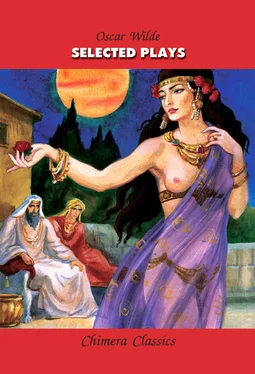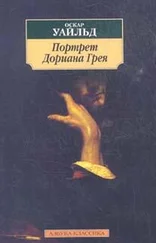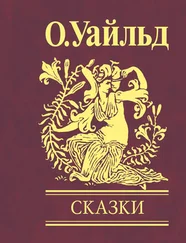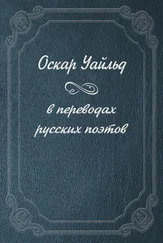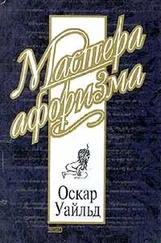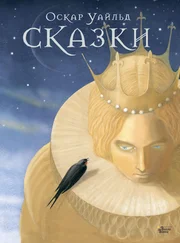JOKANAAN. Never! daughter of Babylon! Daughter of Sodom! Never.
SALOMÉ. I will kiss thy mouth, Jokanaan. I will kiss thy mouth.
THE YOUNG SYRIAN. Princess, Princess, thou who art like a garden of myrrh, thou who art the dove of all doves, look not at this man, look not at him! Do not speak such words to him. I cannot endure it… Princess, do not speak these things.
SALOMÉ. I will kiss thy mouth, Jokanaan.
THE YOUNG SYRIAN. Ah! (He kills himself and falls between SALOMÉ and JOKANAAN .)
THE PAGE OF HERODIAS. The young Syrian has slain himself! The young captain has slain himself! He has slain himself who was my friend! I gave him a little box of perfumes and ear-rings wrought in silver, and now he has killed himself! Ah, did he not say that some misfortune would happen? I too said it, and it has come to pass. Well I knew that the moon was seeking a dead thing, but I knew not that it was he whom she sought. Ah! why did I not hide him from the moon? If I had hidden him in a cavern she would not have seen him.
FIRST SOLDIER. Princess, the young captain has just slain himself.
SALOMÉ. Suffer me to kiss thy mouth, Jokanaan.
JOKANAAN. Art thou not afraid, daughter of Herodias? Did I not tell thee that I had heard in the palace the beatings of the wings of the angel of death, and hath he not come, the angel of death?
SALOMÉ. Suffer me to kiss thy mouth.
JOKANAAN. Daughter of adultery, there is but one who can save thee, it is He of whom I spake. Go seek Him. He is in a boat on the sea of Galilee, and He talketh with His disciples. Kneel down on the shore of the sea, and call unto Him by His name. When He cometh to thee (and to all who call on Him He cometh), bow thyself at His feet and ask of Him the remissions of thy sins.
SALOMÉ. Suffer me to kiss thy mouth.
JOKANAAN. Cursed be thou! daughter of an incestuous mother, be thou accursed!
SALOMÉ. I will kiss thy mouth, Jokanaan.
JOKANAAN. I will not look at thee, thou art accursed, Salomé, thou art accursed. (He goes down into the cistern. )
SALOMÉ. I will kiss thy mouth, Jokanaan; I will kiss thy mouth.
FIRST SOLDIER. We must bear away the body to another place. The Tetrarch does not care to see dead bodies, save the bodies of those whom he himself has slain.
THE PAGE OF HERODIAS. He was my brother, and nearer to me than a brother. I gave him a little box full of perfumes, and a ring of agate that he wore always on his hand. In the evening we were wont to walk by the river, and among the almond trees, and he used to tell me of the things of his country. He spake ever very low. The sound of his voice was like the sound of the flute, of one who playeth upon the flute. Also he had much joy to gaze at himself in the river. I used to reproach him for that.
SECOND SOLDIER. You are right; we must hide the body. The Tetrarch must not see it.
FIRST SOLDIER. The Tetrarch will not come to this place. He never comes on the terrace. He is too much afraid of the prophet.
(Enter HEROD, HERODIAS, and all the Court.)
HEROD. Where is Salomé? Where is the Princess? Why did she not return to the banquet as I commanded her? Ah! there she is!
HERODIAS. You must not look at her! You are always looking at her!
HEROD. The moon has a strange look tonight. Has she not a strange look? She is like a mad woman who is seeking everywhere for lovers. She is naked too. She is quite naked. The clouds are seeking to clothe her nakedness, but she will not let them. She shows herself naked in the sky. She reels through the clouds like a drunken woman… I am sure she is looking for lovers. Does she not reel like a drunken woman? She is like a mad woman, is she not?
HERODIAS. No; the moon is like the moon, that is all. Let us go within… We have nothing to do here.
HEROD. I will stay here! Manasseh, lay carpets there. Light torches, bring forth the ivory table, and the tables of jasper. The air here is sweet. I will drink more wine with my guests. We must show all honours to the ambassadors of Cæsar.
HERODIAS. It is not because of them that you remain.
HEROD. Yes; the air is very sweet. Come, Herodias, our guests await us. Ah! I have slipped! I have slipped in blood! It is an ill omen. Wherefore is there blood here?… and this body, what does this body here? Think you I am like the King of Egypt, who gives no feast to his guests but that he shows them a corpse? Whose is it? I will not look on it.
FIRST SOLDIER. It is our captain, sire. He is the young Syrian whom you made captain of the guard but three days gone.
HEROD. I issued no order that he should be slain.
SECOND SOLDIER. He slew himself, sire.
HEROD. For what reason? I had made him captain of my guard.
SECOND SOLDIER. We do not know, sire. But with his own hand he slew himself.
HEROD. That seems strange to me. I had thought it was but the Roman philosophers who slew themselves. Is it not true, Tigellinus, that the philosophers at Rome slay themselves?
TIGELLINUS. There be some who slay themselves, sire. They are the Stoics. The Stoics are people of no cultivation. They are ridiculous people. I myself regard them as being perfectly ridiculous.
HEROD. I also. It is ridiculous to kill oneself.
TIGELLINUS. Everybody at Rome laughs at them. The Emperor has written a satire against them. It is recited everywhere.
HEROD. Ah! he has written a satire against them? Cæsar is wonderful. He can do everything… It is strange that the young Syrian has slain himself. I am sorry he has slain himself. I am very sorry; for he was fair to look upon. He was even very fair. He had very languorous eyes. I remember that I saw that he looked languorously at Salomé. Truly, I thought he looked too much at her.
HERODIAS. There are others who look too much at her.
HEROD. His father was a king. I drove him from his kingdom. And of his mother, who was a queen, you made a slave – Herodias. So he was here as my guest, as it were, and for that reason I made him my captain. I am sorry he is dead. Ho! why have you left the body here? I will not look at it – away with it! (They take away the body.) It is cold here. There is a wind blowing. Is there not a wind blowing?
HERODIAS. No; there is no wind.
HEROD. I tell you there is a wind that blows… And I hear in the air something that is like the beating of wings, like the beating of vast wings. Do you not hear it?
HERODIAS. I hear nothing.
HEROD. I hear it no longer. But I heard it. It was the blowing of the wind. It has passed away. But no, I hear it again. Do you not hear it? It is just like the beating of wings.
HERODIAS. I tell you there is nothing. You are ill. Let us go within.
HEROD. I am not ill. It is your daughter who is sick to death. Never have I seen her so pale.
HERODIAS. I have told you not to look at her.
HEROD. Pour me forth wine. (Wine is brought.) Salomé, come drink a little wine with me. I have here a wine that is exquisite. Cæsar himself sent it me. Dip into it thy little red lips, that I may drain the cup.
SALOMÉ. I am not thirsty, Tetrarch.
HEROD. You hear how she answers me, this daughter of yours?
HERODIAS. She does right. Why are you always gazing at her?
HEROD. Bring me ripe fruits. (Fruits are brought.) Salomé, come and eat fruits with me. I love to see in a fruit the mark of thy little teeth. Bite but a little of this fruit that I may eat what is left.
SALOMÉ. I am not hungry, Tetrarch.
HEROD. (To HERODIAS.) You see how you have brought up this daughter of yours.
HERODIAS. My daughter and I come of a royal race. As for thee, thy father was a camel driver! He was a thief and a robber to boot!
HEROD. Thou liest!
HERODIAS. Thou knowest well that it is true.
Читать дальше
Конец ознакомительного отрывка
Купить книгу
